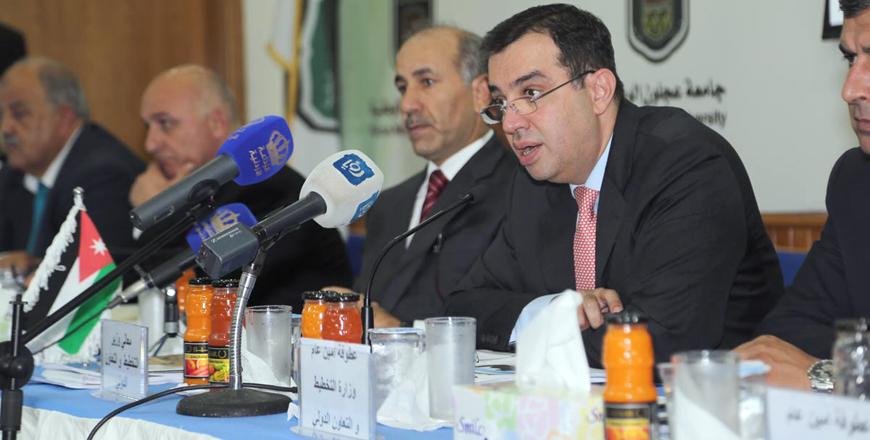You are here
Stakeholders evaluate impact of Syrian crisis on labour market
By Ana V. Ibáñez Prieto - May 13,2018 - Last updated at May 13,2018
AMMAN — The Economic Research Forum (ERF) on Sunday inaugurated its policy conference on “Employment, Education and Housing in Jordan: The Impacts of the Syrian Refugee Influx” in Amman, which is set to continue through Monday.
Held in cooperation with the Economic and Social Council (ESC) and the Department of Statistics (DoS), the conference started with a policy-oriented discussion examining the impact of the Syrian refugee crisis on the wellbeing of Jordanians, followed by an academic seminar presenting the results of a survey on the Jordanian labour market.
Planning Minister Imad Fakhoury thanked the partners “for their efforts in presenting facts, statistics and papers that are essential for decision makers and the conduction of national dialogue towards development”.
“However, in order to discuss this, we need to look at the refugee crisis as a whole,” the minister stressed, adding that “Jordan has never relinquished its duty to host our Arab brothers despite the challenges. But, in the 8th year of conflict, the crisis has already affected several sectors in the Kingdom and exhausted capacities”.
“This adds to the delay — or rather inadequacy — in the support provided by the international community,” Fakhoury continued, highlighting the gaps and imbalances in the aid provided “despite Jordan’s appreciation”.
Outlining the figures provided in the studies, Minister of Education Omar Razzaz said: “Having numbers to analyse rather than just viewpoints gives us something to rely on when building our policies.”
He stressed that Syrian refugee children are distributed among 47 schools in refugee camps and 207 schools in the rest of the Kingdom, with a total of 130,000 children enrolled in formal education.
“This raises the question of where all the other children are,” the minister stated, noting that leaving children out of school leads to issues such as early marriage and child labour.
Secretary General of the Labour Ministry Hani Khleifat underlined the severe impact of 1.4 million Syrian refugees on the Jordanian labour market, “in a context of unemployment rated already on the rise”.
“The Ministry of Labour has followed the Royal directions on dealing with refugees through a humanitarian approach,” the official said, noting that the ministry has issued over 100,000 flexible work permits that allow refugees to leave the camp and pursue employment.
“But this has impacted the host communities and we need to hold hands with the Syrians while caring for the most vulnerable Jordanian people,” Khleifat continued, noting the ministry’s intention to apply the forum’s recommendations on enforcing labour laws and holding employers accountable for their application.
“The deteriorating security situation in the region as a whole, and Syria in particular, has resulted in large flows of refugees into Jordan and a reduction in tourism and foreign investment,” a statement by the ERF said, adding that “the challenges facing Jordan have put serious strains on the Kingdom’s economy and its labour market, which were manifested in a substantial slowdown in economic growth and a decline in employment rates among Jordanians”.
Aiming to examine the impact of the Syrian refugee influx on the labour market outcomes and the access to education services and housing for Jordanians, the forum builds on the data collected as part of the second wave of the Jordan Labour Market Panel Survey, in 2016 and 2017, which was implemented by ERF in cooperation with DoS.
“ERF has continuously supported decision making towards development and capacity building and we have shown great interest in establishing instruments in this direction,” ERF Managing Director Ibrahim Elbadawi said, pointing out that the organisation relies on data from 15 countries across the region, in 93 databases available for consultation by policymakers.
Related Articles
AZRAQ REFUGEE CAMP — The International Labour Organisation (ILO) and UNHCR on Sunday opened the first centre for employment at the Azr
The Syrian refugee crisis is accentuating the need to tackle pre-existing labour market issues in Jordan, according to an ILO report.
AMMAN — The government is expected to spend JD124 million on the Jerash Governorate development programme between 2016 and 2018, Planning an


















